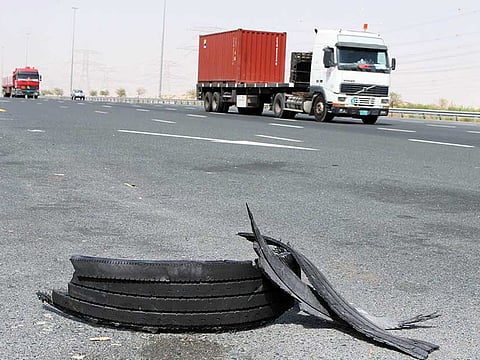The danger lurking in your tyres
Experts call on motorists to pay greater attention to tyre safety

Dubai: Your car is good as its tyres are. No matter how good the vehicle is, if the tyres are not safe enough, you are bound to be in trouble, warn industry experts.
Every year, tyre blow-outs lead to several road accidents in the country, with many cases reported particularly during summer.
Though, the number of tyre-related accidents have come down this year, due to increased awareness and stricter regulations, experts feel the danger lurks around if the motorists don’t pick the right tyres or don’t maintain them regularly.
“The tyres of a vehicle play a significant role in ensuring its safety, because they are the only part of the vehicle that comes in contact with the road’s surface. Tyres in the region should bear approval and certification from the Gulf Standards Organisation (GSO), certifying that these tyres can be utilised safely across warm climate conditions present in the region,” said Kenneth Arnold, General Manager, ZDEGREE, a leading auto maintenance workshop in Dubai, with a specific focus on tyres.
Arnold added that buying authentic tyres and knowing how to read the details mentioned on the tyre’s sidewalls is key to having safer road trips.
“Respect the tread wear indicator (TWI) marked on the sidewall in the form of a triangle or tyre brands’ logo or TWI marking. This indicates the stage when you need to replace tyres. Using the tyres beyond the TWI will jeopardise safety,” he said.
However, he acknowledged that more and more motorists are now increasingly aware about buying authentic and fresh set of tyres.
“We have observed that consumers now have increased awareness and understanding of the production week mentioned on a tyre’s sidewall, as many of them are now insistent on purchasing a fresh set of tyres,” he added, attributing increased awareness to a series of awareness initiatives and training programmes held by authorities like the Emirates Authority Standardisation and Metrology (ESMA) in association with tyre firms.
Over the last couple of years, ESMA has completely overhauled the tyre standards and regulation, introducing many certifying and authenticating features like RFID labels, while banning the import and sale of used tyres.
“ESMA remains actively involved in ensuring that the tires being sold in the UAE conform to the GSO standards. In line with this, ESMA has spearheaded the initiative of utilising RFID labels on the tyres, which reduces the proliferation of non-certified tyres in the UAE. An equally noteworthy effort is ESMA’s move to involve tyre companies and include them in their technical committee, which is aimed to further promote RFID regulation and encourage its use,” he explained.
However, the responsibility of the motorists doesn’t end after having good quality tyres installed in their vehicles, as maintenance of tyres is also equally important.
“It is very important that vehicle owners are aware of the importance of using good quality tyres, however, tyre maintenance is also equally important. Tyre pressure should be checked on a regular basis, while also looking for uneven wear,” said Gordon Ferguson, General Manager at AAA Service Centre.
He added that poorly maintained tyres combined with extreme heat in the region can lead to a blow-out.
“A blow-out is a very dangerous situation and people can easily get killed, either people in the car or other road users. It is the responsibility of the motorists to ensure they look after the tyres regularly. If they don’t know they should seek the assistance of proper industry professionals,” Ferguson added.
Further elaborating on the maintenance of tyres, Arnold shed a light on why inflation pressure of tyres is so important.
“Tyres perform well when they are properly inflated. If the tyres are underinflated, the temperature inside the tyres go up significantly. This along with scorching summer heat makes things worse and can lead to a tyre failure and at times can be very damaging,” said Arnold.
According to Arnold, there are lot of misconceptions about appropriate tyre pressure to be maintained.
“The right pressure to be followed in tyres is as per car manufacturers’ recommendations and you will find it on the owner’s manual and in the tyre placard pasted at the driver’s side door or on the fuel tank lid,” he added.
He also urged motorists to regularly check for wear and tear apart from having the tyres rotated every 8,000 kilometres.
Here is how to keep your tyres safe:
• Check the inflation pressure of tyres every fortnight as tyres have natural tendency to lose pressure on their own even when they are not in use.
• When you check the pressure, also check for objects embedded in the tread, such as stones or glass.
• Check for uneven wear, which could indicate a problem with car’s alignment or suspension.
• Run your hands over the tread and sidewalls to check for any bubbles, cuts or cracks.
• Have tyres balanced and a wheel alignment done, when installing new tyres.
• Tyre rotation should be done every 8,000 Kms in order to maintain even wear on all four tyres of the car.
• Periodic wheel alignment and balancing will also help even wear of the tyres.
• Respect the tread wear indicator marked on the sidewall. This indicates the stage when you need to replace tyres.
Sign up for the Daily Briefing
Get the latest news and updates straight to your inbox


